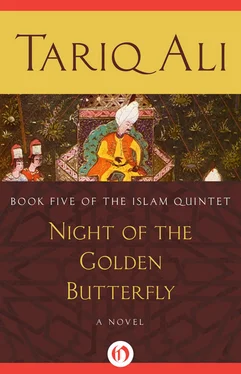Zaynab threw the magazine in the kitchen bin. ‘Let it putrefy happily in the company of rotting vegetable matter and discarded eggs past their sell-by date.’
‘Why are you so angry? Naughty’s just trying to assert her independence and make a bit on the side. Not the first nor the last to do so.’
‘Perhaps not, but do you have any idea how bad things are in this town? At three dinner parties over the past fortnight, and with very different types of people, the minute they realized I was brought up a Muslim, the same question was pointedly repeated and usually by very nice, cultured people and always with a charming smile: Why does your religion insist on female circumcision? I was enraged by this absurdity. Where on earth have they got that idea from? I was polite the first few times and said that as far as I knew the millions of Muslims in Indonesia, China and South Asia had never suffered from this practice. It was restricted to parts of Africa and had tribal origins. Christian women in those areas were also mutilated. No injunction in the Koran or the traditions that I know so well demands it. And I was quite proud that this was so. I was unchallengeable. The third time it happened I did raise my voice. If men can be circumcised, why not women? It was a sign of our equality. Anything a man could bear, so could we.’
‘And?’
‘Shock. Horror. Till they realized I was being facetious, and then I let them have it. I really did. This last dinner party was in a very proper, polite, even haute bourgeois household. Still they asked. The level of ignorance was so toxic that there was a moment when I thought I’d drop my poison capsule in the host’s wine.
‘To change the subject, I inquired whether anyone at the table was a strict believer, since I certainly did not qualify. Two young men, both Normaliens, admitted without a trace of shyness that they were practising Roman Catholics and, to the embarrassment of their parents, they put up a staunch philosophical defence. I asked about abortion. They were opposed. Divorce and contraception were issues that could be discussed, but this was not a romantic reverence for religious tradition. It was the real thing.
‘So they’re all doing religion, I thought to myself. And France, like Italy, despite pretensions to the contrary, is a Catholic country. The veneer of the Enlightenment is wearing off very fast. Why just attack us? Munafiqeen. Hypocrites. You can’t imagine what a relief it was to escape from all this and return to bed with my Stendhal. You were so right. I love him, and he writes at such a pace that you read him with the same rhythm. Why the soppy look on your face? Am I wrong? I’m glad you’re back. Can’t you move here? I mean travel from Paris to wherever you go to give your lectures, instead of from London?’
I had never imagined I would someday hear Zaynab defending the faith with such vim, but then Euro-crassness had that effect on many Muslims, believers and unbelievers, who now lived and worked on the Continent. A month in this city had revived her spirits. I knew she had been extremely depressed by Plato’s death and by her inability to stay behind and watch him suffer and die. But she was recovering, and rapidly. It was this quality in Zaynab, her refusal to sham in order to please, as so many of our acquaintance did, that I found so attractive. This quality had created the affinity. From the very first time I met her I had been struck by her lack of affectation, whether we were alone or in company — as we were about to be that night, since she had invited a dozen people to dinner at a restaurant situated conveniently close to the entrance of her apartment. That’s where we normally ate, since — like many other women of my acquaintance — she was not one of nature’s cooks. It was time for a confession.
‘Zaynab, I have no idea whether or not Balzac ever ate here. I just made that up to expedite your decision on the apartment.’ She laughed, her eyes darting a few flames in my direction. ‘Hai, Allah. That is so funny. I became excited when you told me. After I had come to know the people who own the place I decided to share this information with them. They were so thrilled that they put a large portrait of him in the entrance hall, as you’ll see tonight, and also a quote from Le Père Goriot on the menu. Dara, they’re thinking of changing the name to Le Père Goriot . What should we do?’
‘This is how history is written these days. Leave it be. But let’s suggest that Eugénie Grandet might be a better name for the place. It’s a merciless assault on stinginess and might encourage their customers to spend more. A number of apposite quotations from that could be found to embroider their menus and enhance the impact. They’re doing it all to increase custom. Making money. A true homage to Balzac.’
‘How should I introduce you to the other guests? I don’t mean what you do, but…’
‘What we do?’
‘Something like that. One of the Frenchmen is married to a fading beauty from Karachi, so whatever is said will reach Fatherland. Of that we can be sure. It’s awful how I’m picking up your stupid jargon.’
We discussed the issue for far too long. Alternatives were considered and discarded. Zaynab often indulged in the most rash judgements, a trait not unrelated to her early years of enforced piety and isolation.
‘I could say you’re my brother-in-law who’s visiting for a few days.’
‘Does the Koran have a brother?’
‘You fool. I meant my brother’s brother-in-law.’
‘You mean your sister-in-law’s brother,’
A fit of giggling temporarily immobilized her. I suggested a simpler solution: I would be just another guest. This would avoid any unnecessary rigmarole. Agreement was reached. A phone call in the afternoon from the fading beauty was a relief. An emergency had arisen and she and Jean-Claude had to go and comfort their son in Lyon. Zaynab was two guests short, and this worried her. I suggested one of my nonfiction publishers. If Henri de Montmorency were in town he would be fun and she would realize that Paris still contained critical minds, even more disgusted with official culture than she appeared to be. He was available. He had a new young Tunisian woman, Samira, in tow and they would happily join us for supper. There was a tiny glitch. He had agreed to meet a Chinese author writing a book on Shanghai for a drink and they might be a bit late. I suggested he bring his Chinese author along to dinner. Suddenly the party began to feel more promising. Zaynab had originally organized the dinner to be polite, returning the hospitality of the Islamophobes who had fed her over the past month. She knew this had all the makings of a dire evening and that since she was the hostess, sitting through it in disdainful silence, a satisfying option on other occasions, was excluded.
In fact, the evening proceeded smoothly till Henri de Montmorency and his party arrived. Samira had not bothered to dress up, which surprised some. The Chinese author graciously beamed at us all. It was Henri who became argumentative early on, just as we were busy consuming the first course. He announced that he had just returned from Gaza and began to speak of crimes and atrocities that were being committed by Israel. Even at the best of times this is not a subject greatly appreciated in polite society in Paris. One of the women present, the wife of a liberal newspaper editor, excused herself and we heard her being loudly sick in the lavatory. Her husband rushed to her help as silence reigned at the table. Then the couple returned, the journalist apologized for his wife, who was not feeling well, and they left.
Henri, whose surname concealed his Sephardic origins, of which he was immensely proud, remained unrepentant. ‘This is not the first time, you know. She was sick at another dinner party where I was present a few years ago. That year I was returning from Jenin. I don’t think she’s really sick at all. It’s an act of protest. The minute I saw her I knew that a mention of Gaza would send her straight to the toilet.’
Читать дальше












